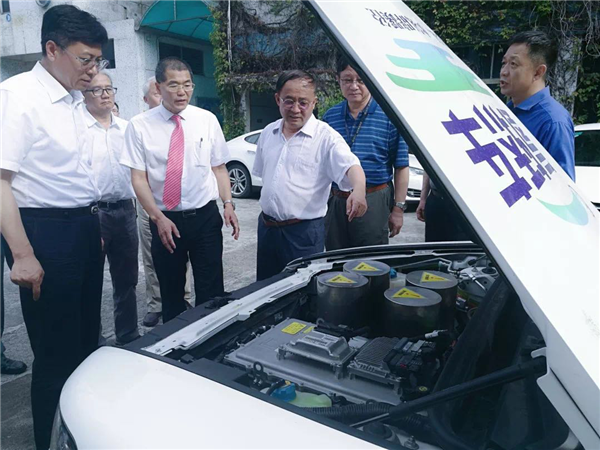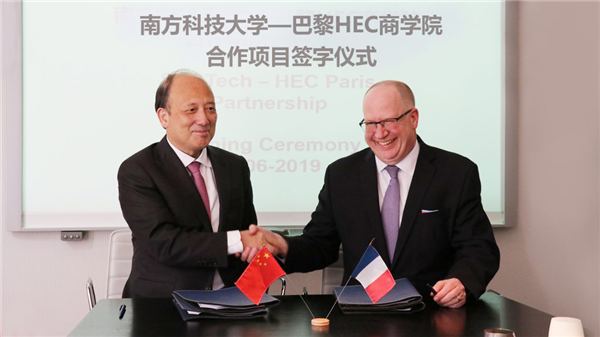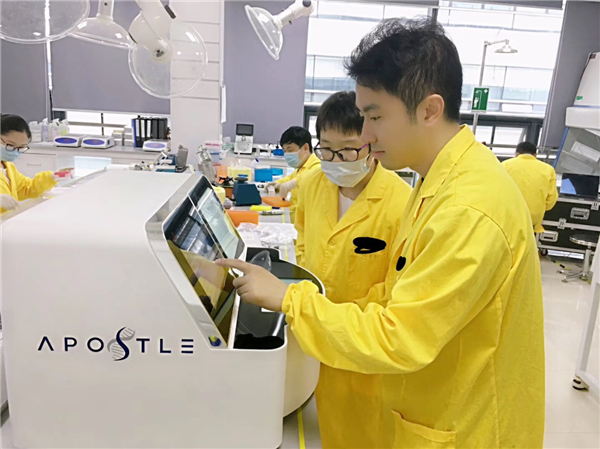Dean of School of Innovation and Entrepreneurship
Since the establishment of Southern University of Science and Technology (SUSTech), SUSTech has long been a leader in the development of its academic disciplines. Its adherence to world-class university standards has seen SUSTech focus on the forefront of discipline development and departmental construction.
Innovation and entrepreneurship are central to the existence of Shenzhen. The genes of entrepreneurial innovation are embedded throughout the land, and with that in mind, SUSTech has a duty to cultivate students with an innovative mind and entrepreneurial heart. As innovators transform knowledge into technology, while entrepreneurs turn technology into wealth, the amalgamation of the two can present untold opportunities for talented individuals.

Every second Friday afternoon, the School of Innovation and Entrepreneurship hosts its lecture series, inviting world-wide famous entrepreneurs, economists and scholars to share their journey thus far. Along with students and faculty members, residents also attend these lectures from across Shenzhen, wishing to get a better understanding of how to improve themselves and their businesses.
In the eyes of Professor Liu Ke, Dean of the School of Innovation and Entrepreneurship, the lecture series is not only part of the School’s general education, but also an incubator for a thriving relationship between the city and its university.
Who is Liu Ke, and why did he choose SUSTech?
As a world-renowned energy expert, Dean Liu Ke has worked in famous multinational companies such as Exxon Mobil, United Technologies Corporation (UTC) and General Electric (GE) in the United States. He has twenty years of experience in petrochemical, hydrogen energy, fuel cell technology, coal gasification and power generation industries. He has more than 80 patents in his name and has been recognized by colleagues around the world, particularly by winning the National Emerald Special Science Award.
Seeing the possibilities in improving the environment in China and his deep love for his country, Liu Ke returned to China ten years ago, joining the National Institute of Clean-and-Low-Carbon Energy (NICE), where he focused on increasing the adoption of clean energy across China. In 2015, Liu Ke was elected as a foreign Fellow of the Australian Academy of Technology and Engineering (ATSE), and is one of only 7 foreign fellows from China.
In 2016, Liu Ke received and accepted an invitation from SUSTech President Chen Shiyi to start the School of Innovation and Entrepreneurship, as well as the Institute of Clean Energy. Liu Ke decided to travel “All The Way South” because of the febrile atmosphere of innovation and entrepreneurship that permeates Shenzhen and SUSTech. He was convinced that Shenzhen would be the place where he could finally make his long-cherished wish of making Chinese skies bluer and water clearer true.
Liu Ke’s green dream is something of legend, fundamentally intertwined with his story of innovation and entrepreneurship.
What is innovation and why is it so important?
Liu Ke raised an important question about innovation. It’s a term we use regularly, but what does it means in a world of scientific and technology research? Innovation means the introduction of a new idea, device or method, as well as the act or process of introducing new ideas, devices or methods. Such a definition is broad, and allows for its use in areas such as industrial or applied research.
In the mind of Liu Ke, innovation is not just doing something that no-one else has done before, but is more the process of transforming knowledge into useful and valuable technology. The understanding of this meaning gives a greater understanding of the broader mission of the School of Innovation and Entrepreneurship at SUSTech.
“Our mission is to transfer knowledge into technology, in what we call applied or industrial research. Furthermore, we will provide opportunities for faculty members to create wealth-producing businesses that promote social progress and generate social influence,” said Liu.
He pointed out that SUSTech’s three pillars of “Research, Innovation and Entrepreneurship” create a circular and self-sustaining relationship. Research encourages the investment of wealth in fundamental science and basic research to generate knowledge. Innovation seeks to transform that knowledge into technology that becomes commercial products. Entrepreneurship aims to turn those technological products into wealth that can be invested in further research. Such a self-sustaining relationship results in benefits for society at all levels, and encourages new approaches to science and engineering.
The founding of the School of Innovation and Entrepreneurship
Liu Ke added that SUSTech’s spiritual pillars have seen its approach to scientific research examine the needs of industry and society. As a result, SUSTech was well ahead of the curve in China to establish the School of Innovation and Entrepreneurship in 2016, with the inspiration in its plans for strengthening industry-university-research cooperation, the development of an innovative, entrepreneurial city of global influence and the advancement of socioeconomic development.
“The Statement, announced by the State Council, provides so many opportunities for SUSTech and Shenzhen. The School of Innovation and Entrepreneurship has developed many industry-university innovation centers across specifically identified areas in the Statement, including clean energy, intelligent manufacturing, data science, advanced materials, biomedical engineering, micro-nano electronic technology and systems, water treatment and soil remediation, biomedicine, aerospace technology, and so on.”
How to develop entrepreneurial talents?
Liu Ke acknowledged the importance of developing their first-rate talent pipeline that will see the School of Innovation and Entrepreneurship collaborate with other colleges and disciplines across SUSTech.

Last year, President Chen Shiyi signed a cooperation agreement with HEC Paris Business School in the presence of French Prime Minister Édouard Philippe. The agreement adds a global element to the iLEAP project, offering students the opportunity to undertake short-term study programs at HEC Paris Business School. Supporting that agreement, entrepreneurs from the School of Innovation and Entrepreneurship launched iLEAP with senior leaders from HEC Paris Business School. A diverse range of students had been recruited from family-run businesses, high-tech enterprises and young start-ups, and has invited luminaries such as SUSTech President Chen Shiyi, Li Daokui, Ma Weihua, Wang Shi and Zhang Yaqin as mentors. Liu Ke said, “We believe that the growth in these three groups will provide significant synergies for everyone.”
The School of Innovation and Entrepreneurship has also developed their Innovative Talents Program that takes practical problems to guide students through a professional Masters of Engineering project. The Innovative Talents Program invites industry experts to guide the students through scientific research projects, as part of a quest to develop an interdisciplinary research & development program that encourages entrepreneurial innovators under a new integrated training system.
In line with encouraging entrepreneurial talent, the School of Innovation and Entrepreneurship supports students and faculty members who wish to start their own businesses based on their scientific and technological research.

In August, the Chinese headquarters of Apostle Inc., an international liquid biopsy company, supported by the School of Innovation and Entrepreneurship at Southern University of Science and Technology (SUSTech) was launched in Bao’an District. Apostle Inc, having received support from Stanford University and SUSTech, has invented best-in-class technologies to work with circulating free DNA (cfDNA), a key element in liquid biopsy. This technique can be used in early cancer screening, diagnosis and other diseases. It helps diagnose and treat tumors and other diseases accurately and effectively.
Liu Ke is exceptionally proud of the numerous high-tech entrepreneurs that have mastered core technology at SUSTech. “These entrepreneurs have joined us as research professors, set up 6 joint industry-university research laboratories and formed 16 practice bases with top enterprises in strategic industries across the Greater Bay Area. They have aimed to lay out major scientific and technological developments for the future by realizing synergistic industry-university innovation & development to drive and incubate top-level high-tech entrepreneurship companies at SUSTech, in Shenzhen, and across the entire country.”
Liu Ke said that the School of Innovation and Entrepreneurship now has Professors Ge Dongliang, Zhang Bo, Guo Xin, Qiu Chengfeng, Liu Zhengbai, Lu Hongxing and other entrepreneurial teams. They have adopted independent or partnership entrepreneurial models to establish companies in precision medicine, micro-LED and lightweight new materials
The School of Innovation and Entrepreneurship’s faculty team features 29 research professors that is supported by other staff members and visiting adjunct professors from industry. Nearly every department at SUSTech is involved in the School of Innovation and Entrepreneurship, as SUSTech is committed to the activation of scientific research, and its transformation into technology and wealth, for the betterment of society.
Liu Ke’s passions
He believes that the three key factors to solve the haze problem in China are controlling coal pollution, reducing diesel engine and ammonia emissions. His current research focuses on these three major pollution factors.
Not long ago, the front-page headline of Science and Technology Daily published an interview with Liu Ke. He talked about the economics behind of methanol and hydrogen fuel cells that produce hydrogen through catalytic reforming before generating electricity for the fuel cells. Liu Ke has been advocating for methanol and hydrogen power generation technology as a clean energy path for a long time. The industrialization of hydrogen energy in China gives rise to a new dawn that could bring Liu Ke closer to his dream of blue skies and clean water.
In the future, the School of Innovation and Entrepreneurship will continue to look out into the world to absorb new information, adopting and adapting to the new era and the changing world economy. Liu Ke believes that the School of Innovation and Entrepreneurship will provide opportunities for the development of talents with a global outlook, innovative spirit and entrepreneurial heart who want to bring society forward.








